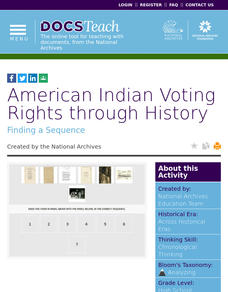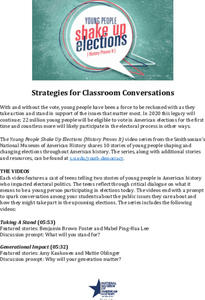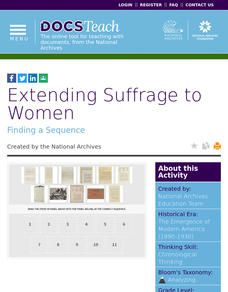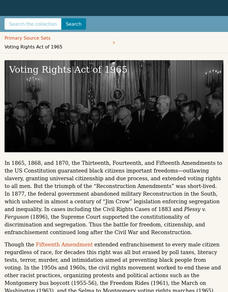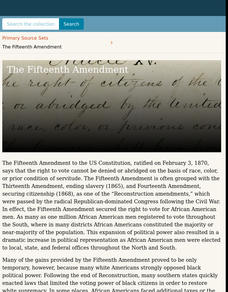US National Archives
Susan B. Anthony and the Struggle for Suffrage
Susan B. Anthony was willing to break the law to gain voting rights for women. Young historians investigate Anthony's willingness to go to jail to draw attention to the suffrage movement. They read and discuss primary source documents to...
DocsTeach
Fannie Lou Hamer and Voting Rights
To understand the challenges Black voters faced in Mississippi, middle schoolers first gather background information about Fannie Lou Hamer and then read her testimony given during the 1964 Democratic Nation Convention. After a...
National Woman's History Museum
Ida B. Wells: Suffragist and Anti-Lynching Activist
Suffragette, investigative journalist, and civil rights activist Ida B. Wells is the focus of a lesson that has young historians study the work of this amazing woman. Scholars watch a video biography of Wells, read the text of her speech...
K20 LEARN
LBJ and Voting Rights
Challenges to voting rights is not a new thing. Using President Lyndon B. Johnson's 1965 "The American Promise" speech on voting rights as a starting point, young historians research current voting rights laws and challenges.
K20 LEARN
Oklahoma and Segregation
It was not just the states of the Deep South that practiced segregation. Young historians investigate the history of segregation and desegregation in Oklahoma. They begin by reading, annotating, and analyzing an article about the impacts...
K20 LEARN
Show Me Your Credentials: Voting In America
The debate over voting rights continues. To begin their study of voting rights, class members first vote on proposed new classroom rules. After a discussion of the activity, groups are given a copy of the 1965 Alabama Literacy Test and...
PBS
Compare State Voting Laws Today with Laws of the Jim Crow Era
Georgia's law S.B. 202 is at the center of a lesson that asks young scholars to examine what critics say are Georgia's attempts to limit voting access to Black voters. Groups then investigate the voting laws in their own state, as well...
Franklin D. Roosevelt Presidential Library & Museum
Voting and Participation in Decision Making
"If you don't vote - you don't count." That's the big idea in this resource about voting and participation in the democratic process. The three included activities focus students on being informed voters, practicing voting for their...
DocsTeach
The 19th Amendment and the Road to Universal Suffrage
Your vote matters! An informative activity focuses on the Nineteenth Amendment and explains how it paved the way for universal voting rights. Young historians analyze several documents and a complete a worksheet, describing the impact of...
DocsTeach
American Indian Voting Rights through History
Vote ... it's your right! An enlightening lesson examines the history of voting rights for Native Americans. Leaners analyze primary documents and place them in chronological order. Academics also create a list of other events that took...
DocsTeach
The Path of Justice: Selma and the Voting Rights Act
The civil rights movement: An ongoing battle for change. The activity focuses on President Johnson's speech in response to the massacre at the Selma March. Academics study the speech, complete a hands-on-activity, and discuss President...
Center for History Education
Women's Rights in the American Century
Today, many young people find it hard to understand why it took over 150 years for women in the United States to get the right to vote—why there was even a need for the suffrage movement. As they read a series of primary source...
DocsTeach
Analyzing a Letter to Congress About Bloody Sunday
The brutality of Bloody Sunday—when non-violent protesters who supported voting rights for African Americans were beaten by police—captured a nation. Young historians examine the letter of one horrified American to Congress to consider...
DocsTeach
Analyzing a Letter About American Indian Voting Rights
An informative activity focuses on the law preventing Native Americans from voting until 1947. Scholars read documents from the Office of Indian Affairs, complete an online worksheet, and participate in group discussion. Academics learn...
DocsTeach
Suffrage Photograph Analysis
Votes for women! Young scholars use images to explore the suffrage movement and its impact on the United States. Historians work in groups or pairs to interpret the photograph, complete a worksheet, and discuss how their opinions of the...
Center for History Education
Helping to Move On? An Analysis of the Reconstruction Amendments
Reconstruction amendments: a helping hand or another form of slavery? An inquisitive lesson compares the Reconstruction legislation that ended slavery, granted citizenship, and protected voting right for African American men. Scholars...
Center for History Education
Democratic Ideas of the 1776 Maryland Constitution
1776 was a year of political upheaval in the American colonies. Academics examine the Maryland Constitution to understand the desire to break with Great Britain. Young historians learn about Maryland's efforts to extend rights to its...
National Woman's History Museum
Women's Suffrage Movement
The National Women's History Museum offers a 20-slide presentation that details the history of the Women's Suffrage Movement from its creation in the 1830s through the passage of the Nineteenth Amendment in 1920.
Smithsonian Institution
Young People Shake Up Elections (History Proves It) Educator Guide
Vote, it's your civic duty! The resource provides several videos about voting in the United States. Scholars watch a series of topics ranging from youth participation to civic action. The educator's guide provides teachers with...
DocsTeach
Extending Suffrage to Women
Votes for women! The activity highlights the push for the Nineteenth Amendment giving women the right to vote. High school scholars learn how the Fifteenth Amendment giving African American men the right to vote helped to spark the...
Digital Public Library of America
Fannie Lou Hamer and the Civil Rights Movement in Rural Mississippi
Good primary resources, offering different perspectives on important issues and events, are hard to find. A packet of 12 primary source images, videos, audio recordings, records, and newspaper articles related to the 1960s civil rights...
Digital Public Library of America
Voting Rights Act of 1965
Despite the passing of the Thirteenth, Fourteenth, and Fifteenth Amendments, as well as the passing of the Voting Rights Act of 1965, the struggle to ensure fair voter registration and election procedures continues. Young historians...
Digital Public Library of America
The Fifteenth Amendment
Fifteen primary sources provide a context for a study of the Fifteenth Amendment to the United States Constitution. The packet captures the excitement for the changes promised by the amendment as well as the backlash against it.
Jane Addams Project
Woman Suffrage
Suffragettes, suffragists, and anti-suffragists. A two-day, richly detailed lesson plan has young historians investigate the twentieth-century suffrage movement. Groups examine primary and secondary source materials about Jane Addams and...











